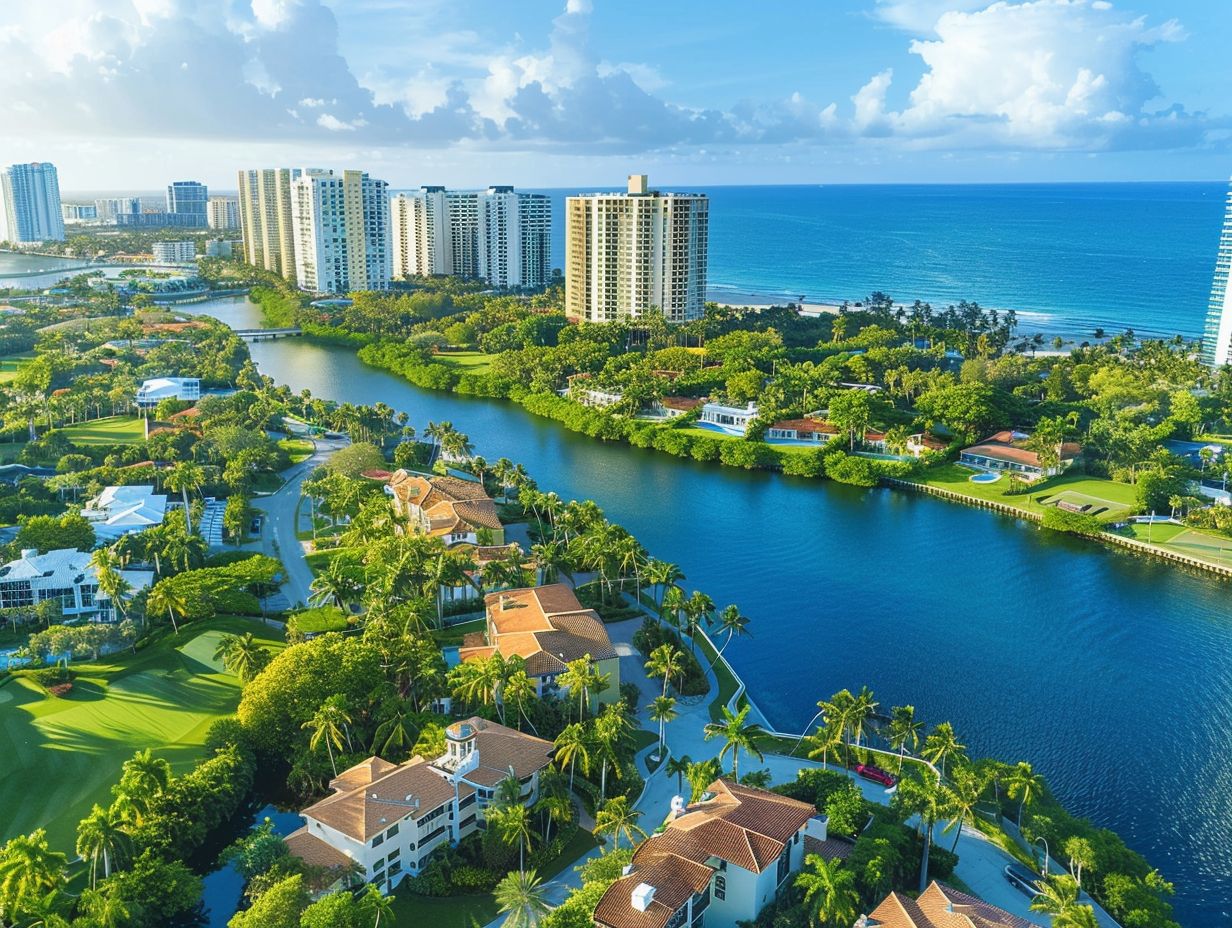Environmental regulations play a vital role in shaping the landscape of real estate in Florida. From protecting natural resources to preserving property values, these regulations have a significant impact on development projects and property transactions.
In this article, we will explore the importance of environmental regulations in Florida real estate, how they affect real estate transactions, the main regulations in place, and how real estate professionals can navigate these regulations to ensure compliance and successful outcomes.
Let’s dive into the world of environmental regulations and their impact on Florida real estate.
Key Takeaways:
- Environmental regulations play a crucial role in Florida real estate by protecting natural resources, preserving property values, and promoting health and safety.
- Key regulations in Florida include the Clean Water Act, Clean Air Act, Endangered Species Act, and National Environmental Policy Act.
- Real estate professionals can navigate these regulations by staying informed, working with environmental consultants, and educating clients on their impact.
The Importance of Environmental Regulations in Florida Real Estate
The significance of environmental regulations in real estate cannot be overstated in Florida. These regulations play a crucial role in ensuring that commercial property transactions are safe and transparent for both buyers and sellers. They address various environmental issues and requirements specific to the region.
What are Environmental Regulations?
Environmental regulations are legal directives aimed at controlling the release of contaminants and hazardous substances into the environment, reducing liability, and ensuring due diligence in property transactions.
These regulations are essential for safeguarding public health, preserving natural ecosystems, and maintaining property integrity. By establishing standards for pollution prevention, waste management, and environmental assessment, they assist in identifying and addressing potential risks in real estate transactions.
Compliance with these regulations allows property owners, buyers, and developers to navigate transactions with increased transparency and confidence in environmental responsibility.
The enforcement of environmental regulations promotes sustainable development practices and contributes to a healthier, cleaner environment for communities.
How Do Environmental Regulations Affect Real Estate?
Environmental regulations impact real estate through the imposition of disclosure obligations on property transactions, aiming to reduce the environmental impact associated with these properties.
These regulations mandate property sellers to reveal any identified environmental hazards or contamination existing on the property, ensuring that buyers have complete information before finalizing a purchase.
This transparency not only shields buyers from potential health risks but also protects the environment from additional deterioration. By fostering awareness and responsibility in real estate dealings, environmental regulations play a critical role in conserving natural resources and averting potential environmental liabilities.
What are the Main Environmental Regulations in Florida?
The key environmental regulations in Florida consist of the Clean Water Act, Clean Air Act, Endangered Species Act, and the National Environmental Policy Act, all of which have significant influence on the environmental framework of the state.
1. The Clean Water Act
The Clean Water Act, which is enforced by the Florida Department of Environmental Protection, governs the discharge of pollutants into water bodies and supports various water projects aimed at maintaining and restoring water quality.
Under the Clean Water Act, the Florida Department of Environmental Protection collaborates with federal agencies such as the Environmental Protection Agency to ensure adherence to water quality standards. This partnership helps pinpoint areas needing improvement and facilitates the implementation of crucial water infrastructure projects throughout Florida.
These projects encompass upgrades to wastewater treatment plants, stormwater management systems, and endeavors to diminish nutrient pollution in waterways, all with the goal of protecting public health and environmental sustainability.
2. The Clean Air Act
The Clean Air Act is intended to regulate air pollution at a national level, ensuring that air quality standards are achieved in Florida to protect public health and the environment.
By establishing emission standards and guidelines for industries, vehicles, and other pollution sources, the Clean Air Act aims to decrease harmful pollutants like carbon monoxide, sulfur dioxide, and particulate matter.
By monitoring air quality through network stations and enforcing regulations to control pollutants, the act plays a crucial role in protecting the well-being of Floridians. The act also encourages the adoption of cleaner technologies to promote a sustainable method of managing air quality in the state.
3. The Endangered Species Act
The Endangered Species Act offers legal protections to threatened and endangered wildlife species and their habitats in Florida, ensuring their conservation and recovery.
These protections play a crucial role in regulating different activities, such as real estate development, to prevent harm to these vulnerable species and their habitats. Developers in Florida must adhere to regulations when planning new construction or land use projects to avoid impacting critical wildlife areas.
The Act assists in finding a balance between conservation efforts and sustainable development, ensuring the safeguarding of endangered species while permitting responsible growth and progress in the state.
4. The National Environmental Policy Act
Federal projects in Florida are required by the National Environmental Policy Act to prepare detailed environmental impact statements to evaluate potential environmental effects before moving forward.
These environmental impact statements play a vital role in assessing how federal projects may impact the environment in Florida. They involve a thorough analysis that examines the ecological equilibrium, potential threats to endangered species, effects on air and water quality, and the overall sustainability of the project.
By conducting these assessments, decision-makers can make better-informed decisions that take into account environmental sustainability alongside project development, ultimately achieving a balance between human advancement and environmental conservation.
How Do These Regulations Impact Real Estate Development in Florida?
Environmental regulations have a notable impact on real estate development in Florida. They lead to increased costs and delays, restrict land use, and necessitate strict disclosure requirements to guarantee compliance and accountability.
1. Increased Costs and Delays
Compliance with environmental regulations often results in increased costs and delays in real estate projects in Florida, as developers must invest in additional assessments and remediation efforts.
These additional requirements can significantly impact a project’s financial feasibility and timeline. The costs associated with conducting environmental assessments, implementing mitigation measures, and complying with regulatory standards can add up quickly, stretching the budget allocated for the project.
The time taken to secure necessary permits and approvals, as well as to address any environmental issues identified, can lead to project delays, causing further financial strain through extended construction periods and increased holding costs.
Balancing environmental responsibilities with project deadlines and budget constraints becomes a critical challenge for real estate developers navigating the regulatory landscape.
2. Limitations on Land Use and Development
Environmental regulations in Florida place restrictions on land use and development to safeguard sensitive areas from environmental harm, which may limit specific types of real estate projects.
The regulations are designed to protect wetlands, coastal areas, and wildlife habitats by limiting extensive development in those areas. For instance, in coastal zones, restrictions on building heights are enforced to prevent the blocking of natural views and negative effects on marine ecosystems.
In flood-prone regions, regulations might restrict construction to minimize flood damage risk and conserve the natural floodplain. These restrictions are crucial for preserving the equilibrium between economic progress and environmental sustainability in Florida.
3. Disclosure Requirements
In Florida, disclosure requirements mandate that sellers must provide detailed environmental reports during real estate transactions to inform buyers about any existing environmental issues.
These reports are crucial in safeguarding both parties involved in the transaction. For buyers, having access to environmental reports can prevent unexpected liabilities from arising after the purchase, ensuring they can make well-informed decisions. Sellers benefit by showcasing transparency and avoiding possible legal issues linked to nondisclosure.
A variety of environmental reports are necessary, including Phase I Environmental Site Assessments, which assess the property’s history to identify potential contamination. Phase II assessments may be required to conduct further investigations into any identified risks.
What Are the Benefits of Environmental Regulations in Florida Real Estate?
Environmental regulations in Florida provide various advantages, such as safeguarding natural resources, maintaining property values, and improving health and safety standards within communities.
1. Protection of Natural Resources
Environmental regulations in Florida play a crucial role in conserving natural resources and ensuring the sustainable use and protection of ecosystems. These regulations assist in waste management to prevent the contamination of water bodies and soil, thus safeguarding the environmental balance.
For example, regulations regarding wastewater treatment plants prevent the introduction of harmful pollutants into waterways, thereby preserving aquatic life. Laws governing air emissions from industries help in decreasing air pollution and safeguarding the health of wildlife and humans.
Florida aims to uphold the beauty and integrity of its diverse ecosystems for generations to come by enforcing these regulations.
2. Preservation of Property Values
Florida helps maintain and potentially enhance property values by enforcing environmental regulations, thus positively impacting the real estate market. Upholding these regulations ensures the protection of natural resources such as clean waterways and preserved green spaces.
This environmental preservation not only attracts potential buyers seeking picturesque locations but also safeguards the health and well-being of current residents.
The focus on sustainability can trigger a ripple effect, where elevated property values mirror the attractiveness of residing in an eco-friendly area. Therefore, by prioritizing environmental standards, Florida cultivates a more appealing real estate market that aligns with the increasing trend of eco-consciousness among buyers.
3. Health and Safety Benefits
Environmental regulations in Florida aim to ensure health and safety by reducing exposure to harmful contaminants and pollutants, thereby creating safer living environments.
These regulations establish guidelines and standards that industries and municipalities must adhere to, monitoring and controlling the release of harmful substances into the air, water, and soil. By enforcing limits on emissions and pollutants, the regulations help prevent health issues such as respiratory problems, cardiovascular diseases, and neurological disorders.
They play a crucial role in safeguarding ecosystems and preserving natural resources for present and future generations. Compliance with these regulations not only protects human health but also contributes to the overall well-being of the environment.
How Can Real Estate Professionals Navigate Environmental Regulations in Florida?
Navigating environmental regulations in Florida can pose challenges for real estate professionals. However, by staying informed, collaborating with environmental consultants, and educating clients, they can achieve compliance and successful transactions.
1. Staying Informed
Real estate professionals in Florida should remain up-to-date on environmental regulation updates to ensure their projects comply and minimize legal risks.
Remaining current on environmental regulations is essential for real estate professionals, as failing to comply can result in costly penalties and project approval delays. Industry experts suggest attending workshops, seminars, and webinars that focus on environmental compliance to stay informed about the continually changing laws.
Subscribing to reputable industry newsletters and maintaining relationships with environmental consultants can also offer valuable insights into regulatory modifications. Regularly checking government websites and engaging with local industry associations can assist real estate professionals in staying informed and proactive when dealing with environmental regulatory matters.
2. Working with Environmental Consultants
Real estate professionals in Florida can benefit from working with environmental consultants to ensure compliance with environmental regulations. These consultants possess a strong grasp of local laws and regulations, making them valuable assets in navigating Florida’s complex environmental compliance landscape.
Their knowledge covers various areas, including wetlands preservation, pollution prevention, and hazardous waste management, offering extensive support in protecting the environment and business interests. Collaborating with environmental consultants not only simplifies the compliance process but also enhances credibility with stakeholders and potential clients, showcasing a dedication to sustainable practices and responsible resource management.
3. Educating Clients
Clients in the real estate industry benefit from being informed about environmental regulations and their impacts. This fosters transparency and trust in real estate transactions in Florida. Real estate professionals must stay abreast of the constantly changing environmental laws and regulations in the Sunshine State. By staying informed, they can effectively communicate these requirements to clients.
One effective approach is providing clients with educational materials or resources detailing the environmental regulations pertinent to their property.
Hosting informational sessions or workshops can assist clients in understanding the importance of compliance with these regulations for the sustainability of their investment. Establishing a solid knowledge base and communication framework regarding environmental regulations contributes to smoother transactions and long-term client satisfaction.
Frequently Asked Questions
1. What are some examples of environmental regulations that impact Florida real estate?
Some examples include wetland preservation laws, building codes for hurricane resistance, and regulations for coastal development.
2. How do environmental regulations affect property values in Florida?
Environmental regulations can impact property values by limiting development and potentially increasing costs for compliance, leading to higher prices for homes and land.
3. Are there any exemptions for environmental regulations in Florida real estate?
There are some exemptions for certain properties, such as historic homes or properties designated for conservation purposes. However, these exemptions may still have certain restrictions and requirements.
4. How do environmental regulations in Florida impact the real estate industry?
Environmental regulations can affect the real estate industry by adding additional costs and restrictions for developers, potentially slowing down the construction process and limiting the availability of certain properties.
5. Are there any potential benefits of environmental regulations for Florida real estate?
Environmental regulations can help protect the natural environment and maintain the aesthetic appeal of certain areas, which can ultimately benefit property values in the long run.
6. How can I stay informed about current and upcoming environmental regulations in Florida?
It is important to regularly check with local and state government agencies responsible for regulating the environment and real estate, as well as staying informed through industry news and updates from professional organizations.



























Rate this article:
Average rating 0 / 5. Vote count: 0
No votes so far! Be the first to rate this post.
No Comments yet!